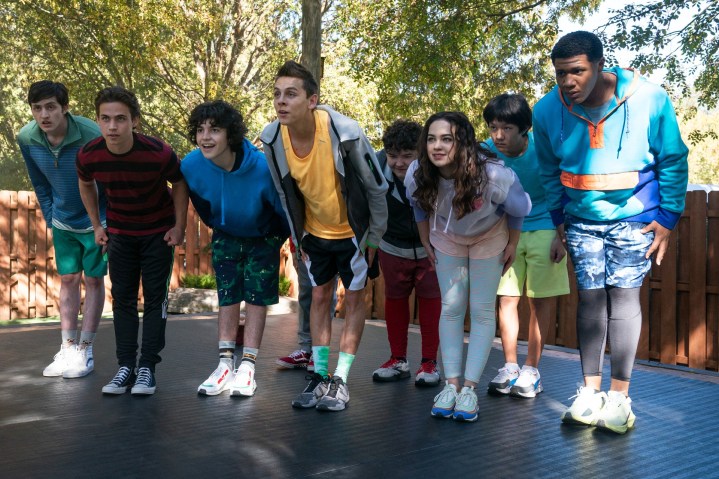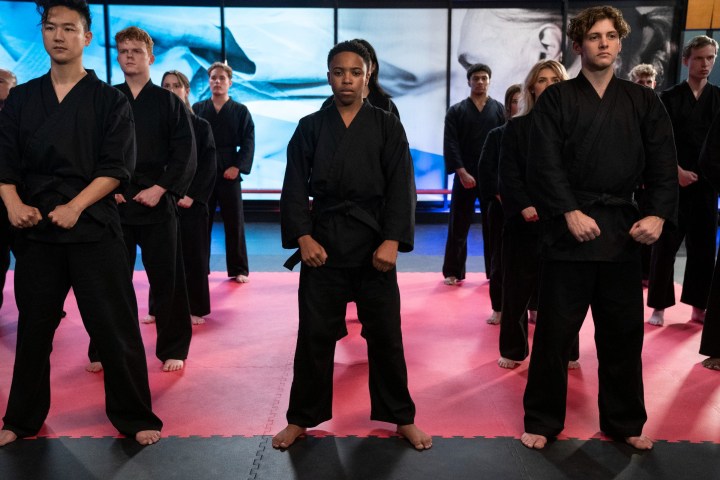In a crowded field of reboots and revivals, Cobra Kai has not only managed to stay alive over four seasons, but has thrived, earning a long list of accolades — including an Emmy nomination — ahead of its upcoming fifth season.
As with prior seasons, Cobra Kai season 5 mixes and matches the allegiances of the franchise’s heroes and villains yet again while bringing back more familiar faces from past Karate Kid films. It’s a formula that keeps working for the series no matter how many times it’s repeated, and the show’s entertaining fifth season continues that trend.

Wax on
The saga of Ralph Macchio and William Zabka’s Karate Kid characters, Daniel LaRusso and Johnny Lawrence, took a dark turn at the end of the show’s fourth season, which put the fate of their merged “Miyagi-Fang” karate school in jeopardy. Season 5 of Cobra Kai finds the pair each dealing with the aftermath of this scenario in different ways: Daniel becomes more committed to stopping Cobra Kai’s sinister new sensei, Terry Silver (Thomas Ian Griffith), while Johnny attempts to make amends for mistakes of his past and finally put karate behind him.
The series’ young cast also find themselves going down paths new and old, with Miguel Diaz (Xolo Maridueña) searching for his father, Sam LaRusso (Mary Mouser) struggling to cope with recent losses, Tory Nichols (Peyton List) forced into a difficult predicament, and Robby Keene (Tanner Buchanan) trying not to repeat his father’s mistakes. Meanwhile, Terry’s rapid expansion of Cobra Kai looms large over the lives of everyone, including the now-incarcerated co-founder of the school, John Kreese (Martin Kove).
There’s a lot going on as the show enters its fifth story arc, but Cobra Kai somehow manages to not only balance all of its narrative threads, but effectively use them to enrich the characters and their shared saga.

Crane kick
Cobra Kai has never been — or aspired to be — a show that holds up under intense scrutiny. It exists in a world where karate is as important to the California community where it’s set as football is to the deep South. Lives are shaped by the rivalries of the local dojos, and the annual All-Valley Karate Tournament can turn kids into local legends.
It’s also a show where violent karate fights can break out anywhere (but somehow result in few lasting injuries) — from the food court of the local mall to the halls of fictional West Valley High School. The audience and the series have an unspoken agreement not to question the silliness of this world, and it works for Cobra Kai, which unfolds in a colorful, alternate reality where karate is life.

That premise gets pushed even further in season 5, and expands the show’s “karate everywhere” conceit well beyond the borders of the San Fernando Valley. Following Daniel’s brief excursion to Okinawa in the show’s third season, Cobra Kai takes its biggest steps outside its traditional California setting in season 5, sending Miguel, Johnny, and Robby to Mexico, among other locations well beyond the valley.
The narrative border-expansion in season 5 pays off, and ultimately makes the series’ world feel quite a bit bigger. That it does so without threatening the distance the show needs to maintain from the real world is a credit to the show’s cast and creative team, who clearly understand how to maintain that fragile balance.

Strike hard
While Macchio and Zabka continue to deliver strong performances in season 5, Maridueña and List both take their characters to a new level in the new season with emotional, dramatic arcs that let them showcase (or continue to showcase, in Maridueña’s case) their range. As the story arc of List’s character, Tory, finally begins to take a positive (and less predictable) turn, the show also does the same for Kove’s villainous role. While it doesn’t give Kove’s John Kreese a completely redemptive arc, it does add more layers to his story, and to the relationship he has with Cobra Kai and everyone he’s crossed paths with over the years.
Playing this season’s primary villain, Griffith throws himself into the role and offers up an antagonist that feels like the anti-Daniel. His character, Terry Silver, has talent and resources to rival (and exceed) Daniel without any of the morals, and it makes him one of the series’ most sinister villains so far. He’s a wonderfully fun foil to the show’s heroes, and his arc brings out the worst and best of both Daniel and Johnny in clever ways.
In a supporting role, Yuji Okumoto’s return as Chozen Toguchi is also a welcome addition to the show’s cast. Although the character largely plays a comedic part in the story, Okumoto brings enough gravitas and capable action chops to the role to prevent the character from becoming a tired, one-note joke.

Sweep the leg
With a cast that seems to grow exponentially each season and the continual (and somehow, effective) recycling of the show’s basic formula, it’s difficult to imagine how long Cobra Kai can keep going. And yet, the series doesn’t show any signs of slowing down in season 5.
The series’ characters evolve just enough with each season to stay interesting, and the show never gets too full of itself or loses its self-aware humor about the surreal, karate-kicking world in which its story unfolds. The fifth season of Cobra Kai manages to hit the sweet spot between feeling both fresh and familiar, delivering plenty of surprises in both the story and the characters’ arcs, while also giving its audience all the cheer-worthy triumphs and shocking (but not too shocking) betrayals they’ve come to expect from it.
Ralph Macchio’s Karate Kid character and the Cobra Kai series are both unlikely champions (of martial arts cinema and the franchise revival era, respectively), and much like Daniel LaRusso himself, it’s hard to root against the series.
Season 5 of Cobra Kai premieres September 9 on Netflix.





